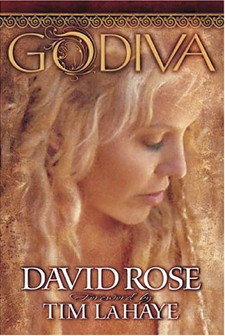|

Godiva
David Rose
By Alyce Wilson
Godiva: The Viking Conquest Saga is the title of the book, and
yet the story focuses on the residents of the British Isles who fight
back against the Vikings, chief among them the plucky young woman of
the title.
The novel is sort of a shaggy dog story with a certain conclusion,
the famous nude ride by Godiva through the streets of Coventry. In David
Rose's version, her ride holds deep symbolic meaning for both the people
of Coventry and Christians, as well.
While the book does boast an introduction by best-selling evangelistic
author Tim LaHaye (of the Left Behind series), the novel does
not come across as preachy. Instead, key characters of the novel demonstrate
a faith that lends them strength as they face the barbarous invaders.
That faith serves to influence others, sometimes leading to enlightenment
and conversion.
Godiva is action-packed, crammed full of battle scenes and political
subterfuge but weak on character development. As a counterpoint, the
title character begins the book as a bouncy, carefree teen, whose unrelenting
good nature strains credulity. Even as circumstances force her into
new roles, she maintains a sort of purity that feels more idealized
than real.
In his efforts to create a textured portrait of the time, Rose has
clearly researched the 11th Century history of Coventry. The story follows
the political maneuverings and tragedies leading to Godiva's famous
ride. Even minute details, such as the fact that a young Godiva plays
soccer, turn out to be based on historical fact, the game of soccer
(or football, as the Brits call it), being popular in Britain from the
8th Century onwards.
If such touches feel occasionally like anachronisms, it is only because
of very modern-sounding dialogue. Young Godiva's conversations with
her parents, for example, sound a little too much like a forthright
21st Century teen chatting with equally modern parents. The parents
are a little too forgiving of her anarchic ways, a little too loving
to seem believable.
And therein lies the real weakness in this work: while Rose is relatively
successful in retelling a legendary tale, he is less successful in making
his characters believable, in endowing them with human characteristics,
human failings, so that their tale seems less like legend and more like
reality.
Whitaker House, 2004 (ISBN: 0-88368-028-9)
|